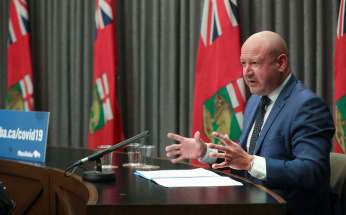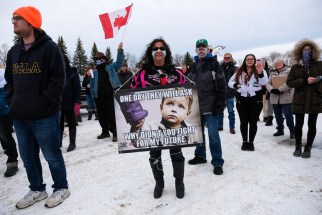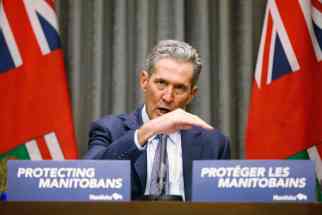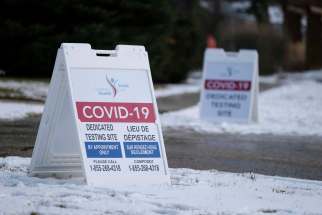Mend the weak link, bar social gatherings by law
Read this article for free:
or
Already have an account? Log in here »
To continue reading, please subscribe:
Monthly Digital Subscription
$0 for the first 4 weeks*
- Enjoy unlimited reading on winnipegfreepress.com
- Read the E-Edition, our digital replica newspaper
- Access News Break, our award-winning app
- Play interactive puzzles
*No charge for 4 weeks then price increases to the regular rate of $19.95 plus GST every four weeks. Offer available to new and qualified returning subscribers only. Cancel any time.
Monthly Digital Subscription
$4.99/week*
- Enjoy unlimited reading on winnipegfreepress.com
- Read the E-Edition, our digital replica newspaper
- Access News Break, our award-winning app
- Play interactive puzzles
*Billed as $19.95 plus GST every four weeks. Cancel any time.
To continue reading, please subscribe:
Add Free Press access to your Brandon Sun subscription for only an additional
$1 for the first 4 weeks*
*Your next subscription payment will increase by $1.00 and you will be charged $16.99 plus GST for four weeks. After four weeks, your payment will increase to $23.99 plus GST every four weeks.
Read unlimited articles for free today:
or
Already have an account? Log in here »
Hey there, time traveller!
This article was published 16/11/2020 (1880 days ago), so information in it may no longer be current.
When government issues a new law, most Manitobans follow it. It may take the threat of sanctions to gain compliance but most people obey the law, whether they agree with it or not.
By contrast, if government simply urges people to behave a certain way (without the weight of law) fewer will comply.
It’s human nature, and it has been seen in spades in Manitoba during the COVID-19 pandemic.
There have been two tracks of communication coming from the province: public health orders approved by cabinet, and “advice” from chief provincial public health officer Dr. Brent Roussin.
The messaging not to socialize outside households falls into the latter category.
Roussin has urged people not to intermingle outside their homes, but it’s just his advice — it’s not the law. By law, people are still allowed to invite up to five guests into their household.
That’s astonishing, given the COVID-19 case numbers in Manitoba. Hospital capacity is at a near-breaking point, ICUs are well above normal capacity, and there is now an alarming shortage of healthy, qualified health-care staff.
If Manitoba continues at this pace, the impact on mortality rates and hospital capacity will be catastrophic.
Roussin has urged people not to intermingle outside their homes, but it’s just his advice– it’s not the law. By law, people are still allowed to invite up to five guests into their household.
Provincial officials came close last week to banning gatherings. They announced tough new rules Nov. 10, but got cold feet. Two days later, they issued a watered-down public health order that left gatherings of five intact (including the household-plus-five clause).
Roussin continues to urge people not to socialize outside their households. He’s been doing that for more than a month; it’s not working.
Manitobans can still invite up to five people into their homes to watch sporting events, have dinner, share drinks or socialize anyway they please. Many are, usually without face masks. It’s preposterous.
It doesn’t have to be the same five people, either. Households can host different people on different days, creating dozens of potential COVID-19 contacts in a single week.
If the rules aren’t crystal clear, even during a pandemic, people will get away with as much as they can.
Roussin argues it wasn’t practical to ban socializing outside households because there are exceptions to the rule, such as the need for some to assist ailing grandparents or provide child care to extended family.
It’s a weak argument.
Other jurisdictions, such as British Columbia, have drafted rules banning socializing outside households, while exempting those types of interactions. Manitoba could do the same, as it does with other aspects of its public health orders.
If government wants greater compliance, it has to put it in law, whether it’s widely enforced or not.
Wearing a mask in indoor public places is mandatory. But under Sec. 14(3) of the Manitoba order, there are seven exemptions where it doesn’t apply (including when someone can’t wear a mask for medical reasons).
It’s unclear whether Roussin intended last week to eliminate gatherings through a public health order and later changed his mind or whether the premier’s office overruled it. Either way, it was a mistake.
If government wants greater compliance, it has to put it in law, whether it’s widely enforced or not.
On Monday, Roussin said government needs more buy-in from the public when it comes to following the spirit and the letter of its orders. He complained some retail outlets were not following the 25 per cent capacity rule. (More enforcement is required if that’s happening.)
Government has to step up and turn some of its “advice” into legal orders, if it wants to improve compliance. It’s naive to expect the same results from both.
Premier Brian Pallister said Monday the province’s efforts to beat COVID-19 are only as good as the weakest link.
Allowing people to gather in their homes with others is one of the weakest links in the public health arsenal. It contributes to the spread of the virus, drives up hospital numbers, and results in more deaths.
It’s time to fix that link.
tom.brodbeck@freepress.mb.ca

Tom has been covering Manitoba politics since the early 1990s and joined the Winnipeg Free Press news team in 2019.
Our newsroom depends on a growing audience of readers to power our journalism. If you are not a paid reader, please consider becoming a subscriber.
Our newsroom depends on its audience of readers to power our journalism. Thank you for your support.
History
Updated on Monday, November 16, 2020 7:50 PM CST: Fixes typo.









